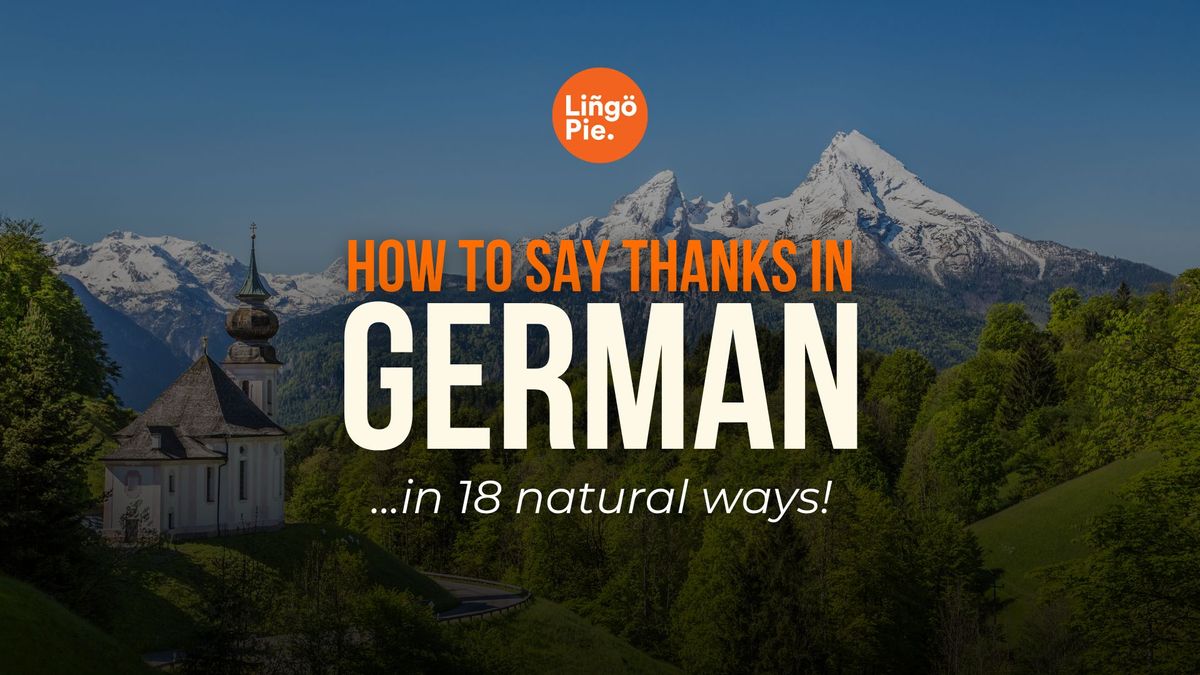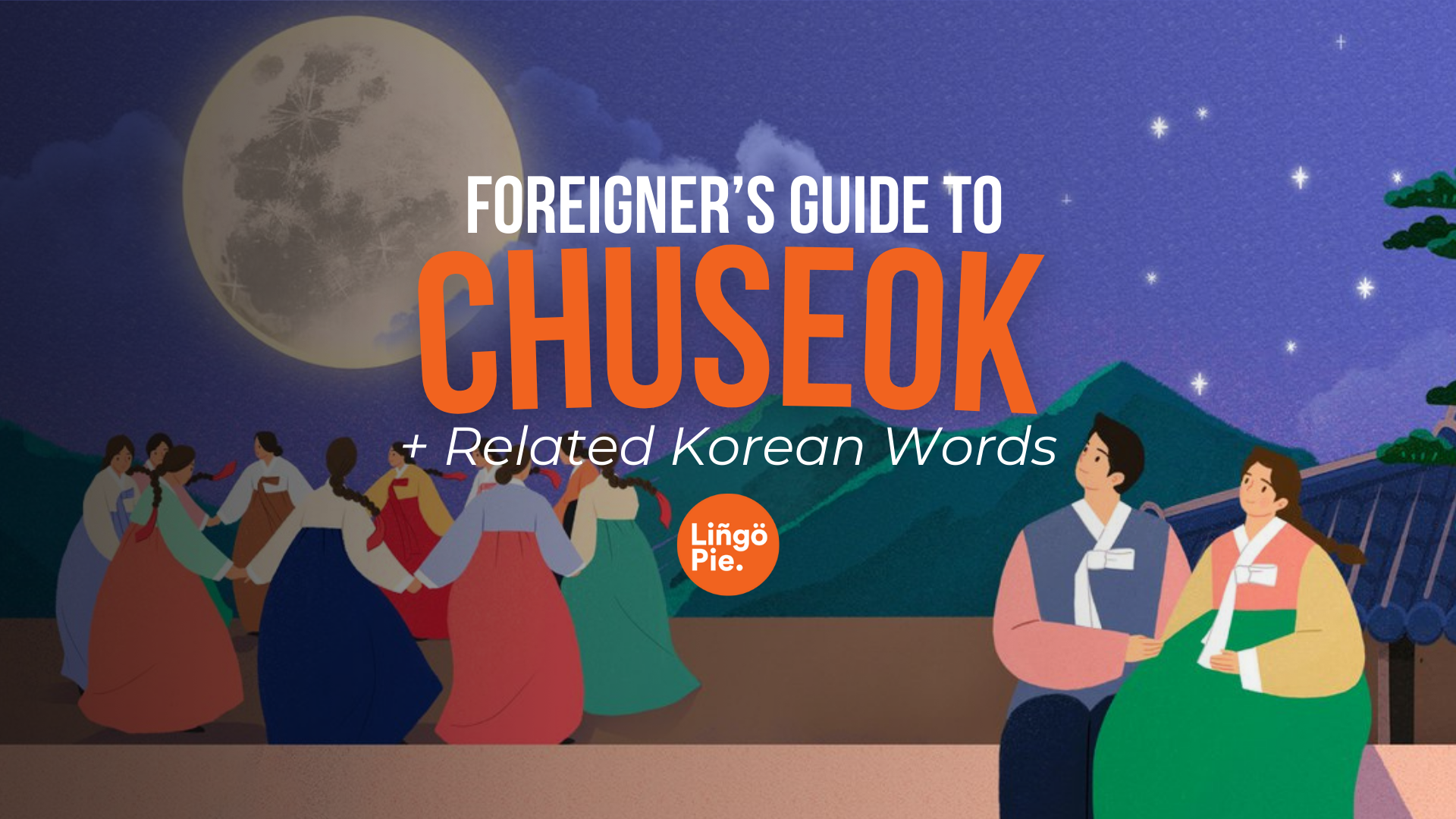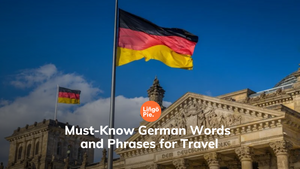Ever dreamed of strolling through the charming streets of Berlin or sipping beer at a traditional Bavarian Biergarten? I know I have! While my dream trip to Germany is still in the planning stages, I've been prepping for that future trip in the most practical way I know how: Learn German basics!
And top of my list? Mastering how to say thank you in German!
Sounds simple, right? Ha! Little did I know that saying thank you in German is not as straightforward as one might think! Turns out, expressing gratitude can be pretty tricky as you have to consider social cues. Say the wrong "Danke," and you might accidentally thank your boss like they're your bar buddy!
Through countless Lingopie lessons (where I may or may not have replayed certain movie scenes just to hear a perfectly pronounced "Dankeschön"), and patient tutors who've endured my mangled attempts at German gratitude, I've finally learned how to say thanks in the most natural way possible.
So in this post, I've gathered all my notes and poured out everything I know to help you express thanks like a native speaker. Let's begin!

What's the most basic way to say thank you in German?
The simplest and most common way to express gratitude in German is "Danke" (pronounced DAHN-kuh). This versatile German word is equivalent to the English "thanks" or "thank you." It's short, simple, and widely understood. You can use it alone as a quick expression of thanks, or as part of a longer phrase to add more detail or emphasis.
In more informal settings, especially when addressing someone familiar or younger, you might use "danke dir." This phrase is a casual way to say thank you, contrasting with the more formal "ich danke Ihnen" used in professional or formal scenarios.
Here's a sample conversation showing how "Danke" is used in everyday situations:
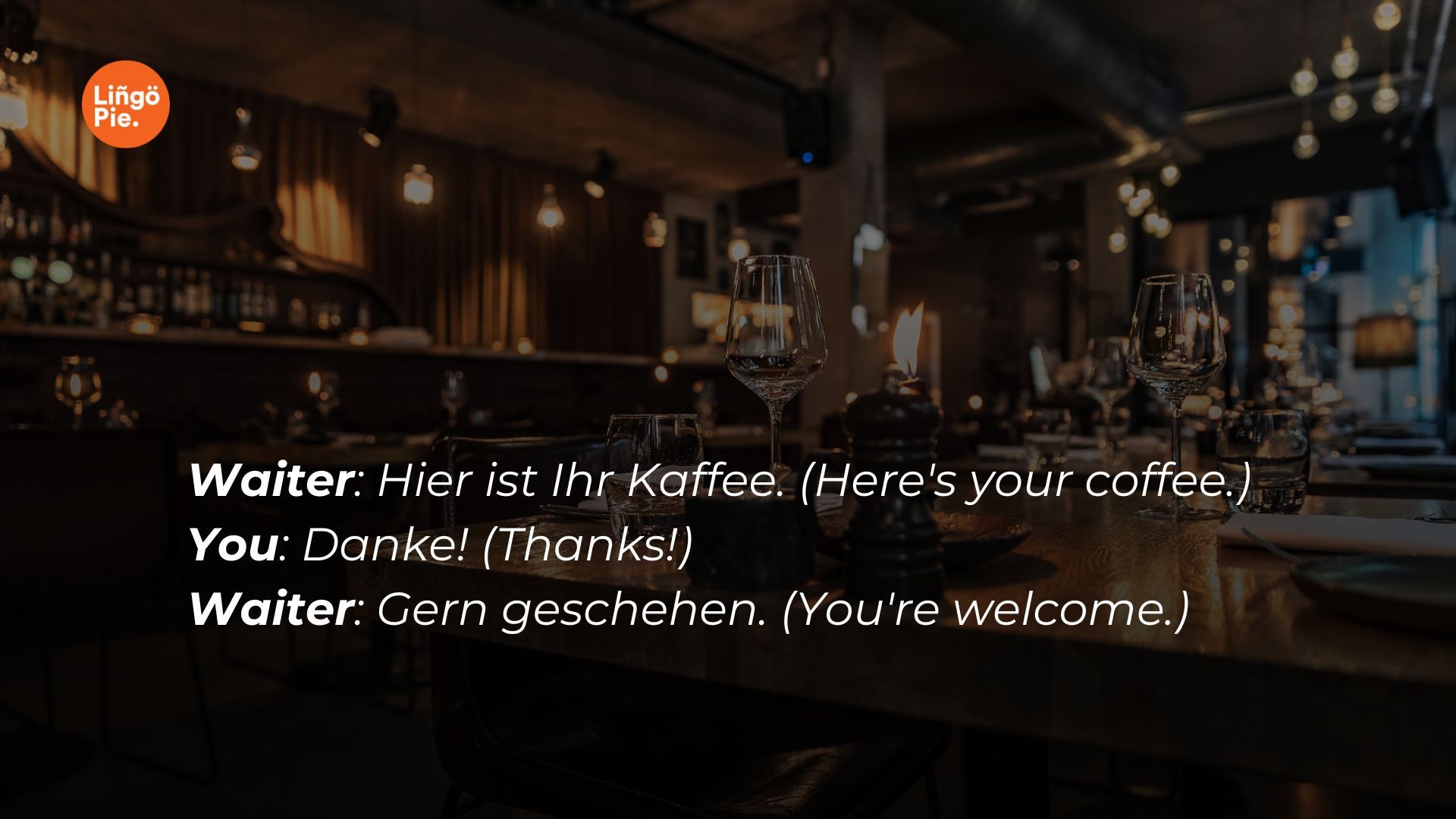
Or in a more detailed exchange:
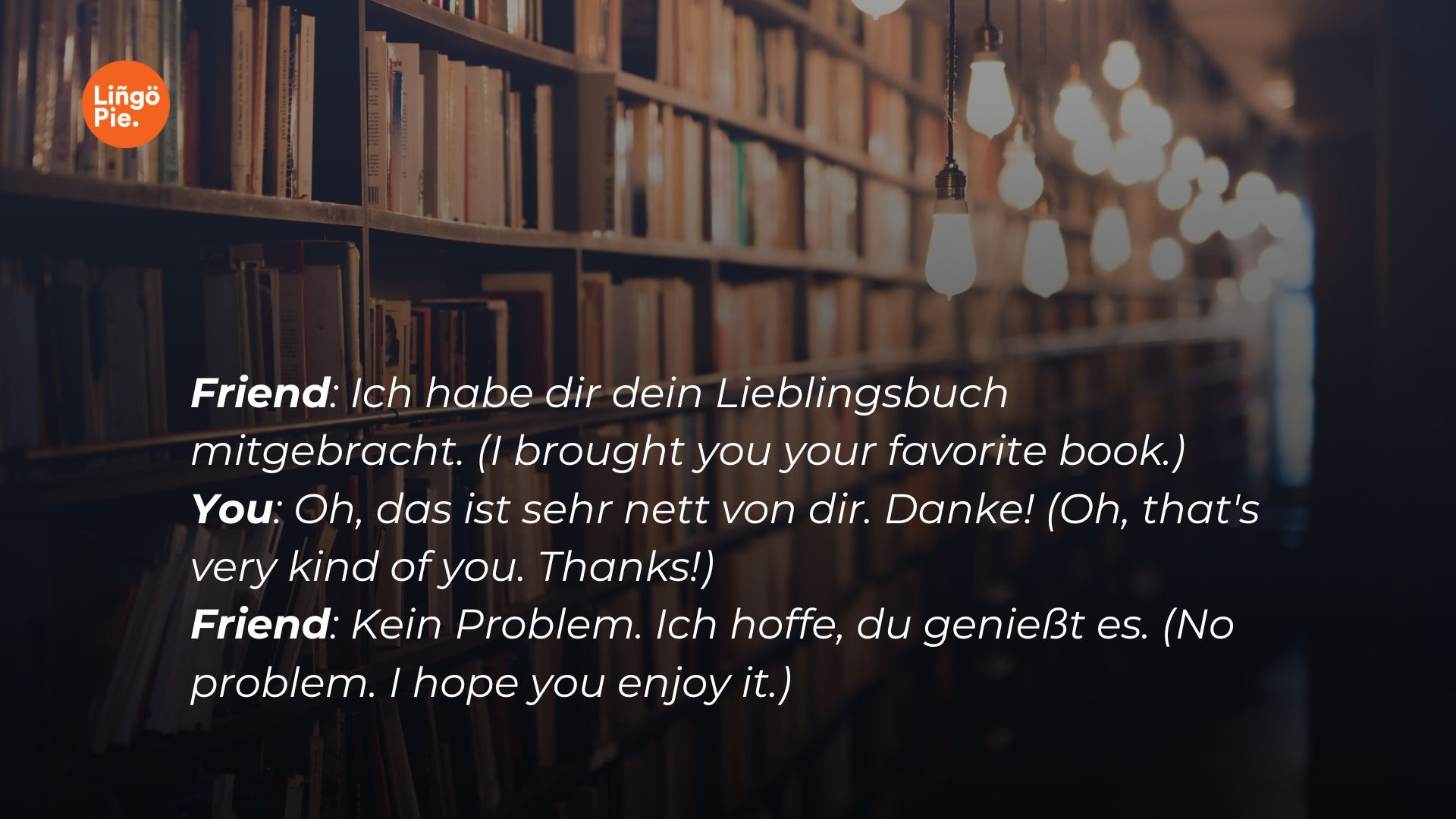
Whether you’re in a café in Vienna, a shop in Berlin, or a business meeting in Zürich, showing appreciation will always be welcomed. Want to know why? Well in German culture, expressing gratitude is highly valued.
And here's the thing: Understanding when to use specific forms of "thank you" in Germany can enhance communication. For example:
- "Danke schön" is often used in more formal or professional settings.
- In southern Germany and Austria, "Vergelt’s Gott" is common in religious or traditional settings.
- "Vielen Dank" is reserved for expressing deeper gratitude, especially in business environments.
Cultural sensitivity enhances language fluency, so mastering these nuances will make your communication more authentic.
What are the different ways to say thank you in German?
Just like in English, the German language offers a rich variety of ways to express gratitude. While "Danke" is the most basic form, native speakers often use different phrases to convey varying levels of appreciation, formality, or enthusiasm.
In this section, we'll explore various German words and phrases for expressing thanks. You'll learn when to use each one, helping you navigate different social situations in German-speaking countries with ease. Trust me, mastering these phrases will help you speak German fluently.
Danke schön — Thank you very much
"Danke schön" (pronounced DAHN-kuh shern) is a common and slightly more formal way to say "thank you very much" in German. It's a step up from the basic "Danke" and conveys a warmer sense of appreciation. As a pronunciation tip, note that the 'ö' in 'schön' is pronounced similarly to the 'e' in 'her', but with rounded lips.
In this German phrase, "Danke" means "thanks," while "schön" literally means "beautiful" or "nice." However, when used with "Danke," it functions as an adverb meaning "nicely" or "kindly," effectively intensifying the thanks.
"Danke schön" is versatile, suitable for both formal and informal situations. It's often used when receiving a gift or a significant favor and can be used alone or as part of a longer sentence.
Example sentences:
- "Danke schön für Ihre Hilfe." (Thank you very much for your help.)
- "Das Essen war ausgezeichnet. Danke schön!" (The food was excellent. Thank you very much!)
It's worth noting that native speakers often write and say "Dankeschön" as a single word. Both forms are correct and commonly used in everyday German.
Danke, gleichfalls — Thank you, you too
"Danke, gleichfalls" (pronounced DAHN-kuh, GLYCH-fuls) is a polite German phrase used to return a kind wish or sentiment. It's equivalent to saying "Thank you, you too" or "Thanks, likewise" in English.
Example sentences:
- Person A: "Schönes Wochenende!" (Have a nice weekend!)
Person B: "Danke, gleichfalls!" (Thank you, you too!) - Colleague: "Gute Arbeit heute." (Good work today.)
You: "Vielen Dank. Danke, gleichfalls!" (Thank you very much. Thanks, you too!)
Using "Danke, gleichfalls" demonstrates good manners and reciprocity, which are valued in German culture. It's a simple yet effective way to show appreciation and politeness in everyday interactions.

Danke sehr — Thank you very much
"Danke sehr" (pronounced DAHN-kuh zair) is another common way to say "thank you very much" in German. This phrase combines the basic "Danke" (thank you) with "sehr" (very), creating a more emphatic expression of gratitude. Basically, "sehr" functions as an adverb here intensifying the thanks, similar to how "very" is used in English.
According to German native speakers, this German phrase is less flowery than "Danke schön" but more emotional than a simple "Danke." This means that it fits comfortably in most situations, from casual to semi-formal. It's particularly useful when:
- You want to show extra appreciation without sounding too elaborate
- You're in a hurry but still want to express sincere thanks
- You're aiming for a more direct communication style
Here are some example phrases where this can be used:
- "Der Kaffee ist ausgezeichnet. Danke sehr!" (The coffee is excellent. Thank you very much!)
- "Danke sehr für die schnelle Antwort." (Thank you very much for the quick response.)
While Germans do appreciate politeness, they also value directness. "Danke sehr" strikes a balance between these two cultural traits.
Danke für — Thank you for...
"Danke für" (pronounced DAHN-kuh foor) is a versatile German phrase that allows you to express gratitude for specific actions or things. This phrase combines the basic "Danke" (thank you) with the preposition "für" (for), allowing you to specify exactly what you're thankful for. It's a crucial construction for those aiming to speak German fluently and express gratitude more precisely.
Example sentences:
- "Danke für Ihre Hilfe." (Thank you for your help.)
- "Danke für das Geschenk!" (Thank you for the gift!)
Here's a table of common words and phrases that can follow "Danke für" to create more specific expressions of gratitude:
| German | English Translation | Example |
|---|---|---|
| alles | everything | Danke für alles. (Thank you for everything.) |
| deine Hilfe | your help | Danke für deine Hilfe. (Thank you for your help.) |
| Ihre Unterstützung | your support (formal) | Danke für Ihre Unterstützung. (Thank you for your support.) |
| das leckere Essen | the delicious food | Danke für das leckere Essen. (Thank you for the delicious food.) |
| die Einladung | the invitation | Danke für die Einladung. (Thank you for the invitation.) |
| Ihr Verständnis | your understanding | Danke für Ihr Verständnis. (Thank you for your understanding.) |
| die Zusammenarbeit | the cooperation | Danke für die Zusammenarbeit. (Thank you for the cooperation.) |
| den tollen Abend | the great evening | Danke für den tollen Abend. (Thank you for the great evening.) |
| Ihre Zeit | your time | Danke für Ihre Zeit. (Thank you for your time.) |
| die Mühe | the effort | Danke für die Mühe. (Thank you for the effort.) |
Pro-tip for language learners: Practice combining "Danke für" with different nouns and phrases to expand your ability to express gratitude in various situations. This will significantly enhance your German skills and help you communicate more effectively in German-speaking countries.

Vielen Dank — Many thanks
"Vielen Dank" is a common German expression used to convey a more emphatic sense of gratitude, equivalent to "many thanks" in English. "Vielen" means "many," intensifying the basic "Danke." This phrase is slightly more formal and heartfelt than a simple "Danke," making it perfect for situations where you want to express deeper appreciation. It's versatile and suitable for both formal and informal settings in German-speaking countries.
- "Vielen Dank für Ihre Hilfe bei diesem Projekt." (Many thanks for your help with this project.)
- "Das Essen war ausgezeichnet. Vielen Dank für den schönen Abend!" (The food was excellent. Many thanks for the lovely evening!)

Danke vielmals — Many thanks!
"Danke vielmals" is another way to say "many thanks" in German, with "vielmals" translating to "many times." This expression carries a similar weight to "Vielen Dank" but has a slightly more traditional feel. It's often used in situations where you want to express profound gratitude or in more formal contexts. Like "Vielen Dank," it's appropriate for a wide range of situations in German-speaking cultures.
- "Danke vielmals für Ihre Unterstützung in dieser schwierigen Zeit." (Many thanks for your support during this difficult time.)
- "Das war sehr großzügig von Ihnen. Danke vielmals!" (That was very generous of you. Many thanks!)
Danke, sehr aufmerksam — Thank you, that’s very kind of you
"Danke, sehr aufmerksam" is a polite German phrase used to express gratitude for someone's thoughtfulness or considerate action. "Sehr aufmerksam" literally translates to "very attentive" or "very thoughtful," but in this context, it's equivalent to saying "that's very kind of you" in English.
This phrase is appropriate in both formal and informal situations, particularly when someone has done something considerate or gone out of their way to be helpful.
- Friend: "Ich habe dir einen Kaffee mitgebracht." (I brought you a coffee.)
You: "Danke, sehr aufmerksam von dir!" (Thank you, that's very kind of you!) - Colleague: "Ich habe Ihre Präsentation Korrektur gelesen." (I proofread your presentation.)
You: "Danke, sehr aufmerksam. Das schätze ich sehr." (Thank you, that's very kind. I really appreciate it.)
Vielen Dank im Voraus — Thank you in advance
"Vielen Dank im Voraus" is a powerful phrase in the German language, equivalent to "Thank you in advance" in English. This expression combines the emphatic "Vielen Dank" (many thanks) with "im Voraus" (in advance), creating a polite way to express gratitude for future action or favor.
When to use it:
- In formal emails or letters when making requests
- When asking for assistance or information
- In professional settings when delegating tasks
Ready to use it? Here's an example sentence you can use!
- "Könnten Sie mir die Unterlagen bis Freitag zusenden? Vielen Dank im Voraus für Ihre Mühe." (Could you send me the documents by Friday? Thank you in advance for your effort.)
Herzlichen Dank — Thank you kindly
"Herzlichen Dank" is a warm and heartfelt way to express gratitude in German. The word "herzlich" means "cordial" or "heartfelt," adding a layer of sincerity to your thanks. This is perfect to use in both formal and informal situations where you want to convey genuine appreciation.
Examples:
- "Herzlichen Dank für Ihre Unterstützung in diesem Projekt." (Thank you kindly for your support in this project.)
- "Das Geschenk ist wunderschön. Herzlichen Dank!" (The gift is beautiful. Thank you kindly!)

Ich bedanke mich — I give you my thanks
"Ich bedanke mich" is a more formal and slightly old-fashioned way of expressing thanks in German. By using the reflexive verb "sich bedanken" (to thank oneself), this phrase literally translates to "I thank myself," but it's understood as "I give you my thanks."
Just a note, this phrase is often used in formal speeches, written correspondence, or when you want to add a touch of elegance to your expression of gratitude.
- "Ich bedanke mich für Ihre Aufmerksamkeit." (I give you my thanks for your attention.)
- "Für Ihre Gastfreundschaft bedanke ich mich herzlich." (I sincerely thank you for your hospitality.)
Ich danke Ihnen — I give you my thanks
"Ich danke Ihnen" is a direct and formal way to express thanks in German. Unlike the more casual "Danke," this phrase explicitly states the act of thanking and uses the formal "Sie" form of address. It's commonly used in professional settings, with strangers, or in situations where you want to show respect.
- "Ich danke Ihnen für Ihren ausgezeichneten Vortrag." (I thank you for your excellent presentation.)
- "Für Ihre Geduld und Ihr Verständnis danke ich Ihnen." (I thank you for your patience and understanding.)
“Ich danke dir” is the informal counterpart to “ich danke Ihnen,” suitable for casual settings among friends while still conveying heartfelt appreciation.

Wie nett von Ihnen — How kind of you
"Wie nett von Ihnen" is a warm way to recognize someone's kindness in German. It's more personal than a simple "Danke" and shows you really appreciate what they've done. Use this phrase when someone goes out of their way to help you or does something unexpectedly nice.
Examples:
- "Sie haben an meinen Lieblingskuchen gedacht? Wie nett von Ihnen!" (You remembered my favorite cake? How kind of you!)
- "Wie nett von Ihnen, mir mit dem schweren Koffer zu helfen." (How kind of you to help me with the heavy suitcase.)
Tausend Dank — A thousand thanks
"Tausend Dank" packs a punch when you're feeling super grateful. It's the German way of saying "thanks a million" or "a thousand thanks." This phrase works great for big favors or when someone really saves the day. It's less formal than some other thank-yous, making it perfect for friends or casual situations where you want to express major gratitude.
- "Tausend Dank für deine Hilfe beim Umzug!" (A thousand thanks for your help with moving!)
- "Du hast meinen Tag gerettet. Tausend Dank!" (You saved my day. A thousand thanks!)
Besten Dank — Thank you very much
"Besten Dank" strikes a nice balance between casual and formal. It's more polite than a quick "Danke" but not as stiff as some other formal phrases. This is your go-to for professional emails, thanking a shopkeeper, or expressing gratitude to someone you're not close with. It shows respect without being overly formal.
Examples:
- "Besten Dank für die schnelle Bearbeitung meiner Anfrage." (Thank you very much for the quick processing of my request.)
- "Das war ein interessanter Vortrag. Besten Dank!" (That was an interesting lecture. Thank you very much!)
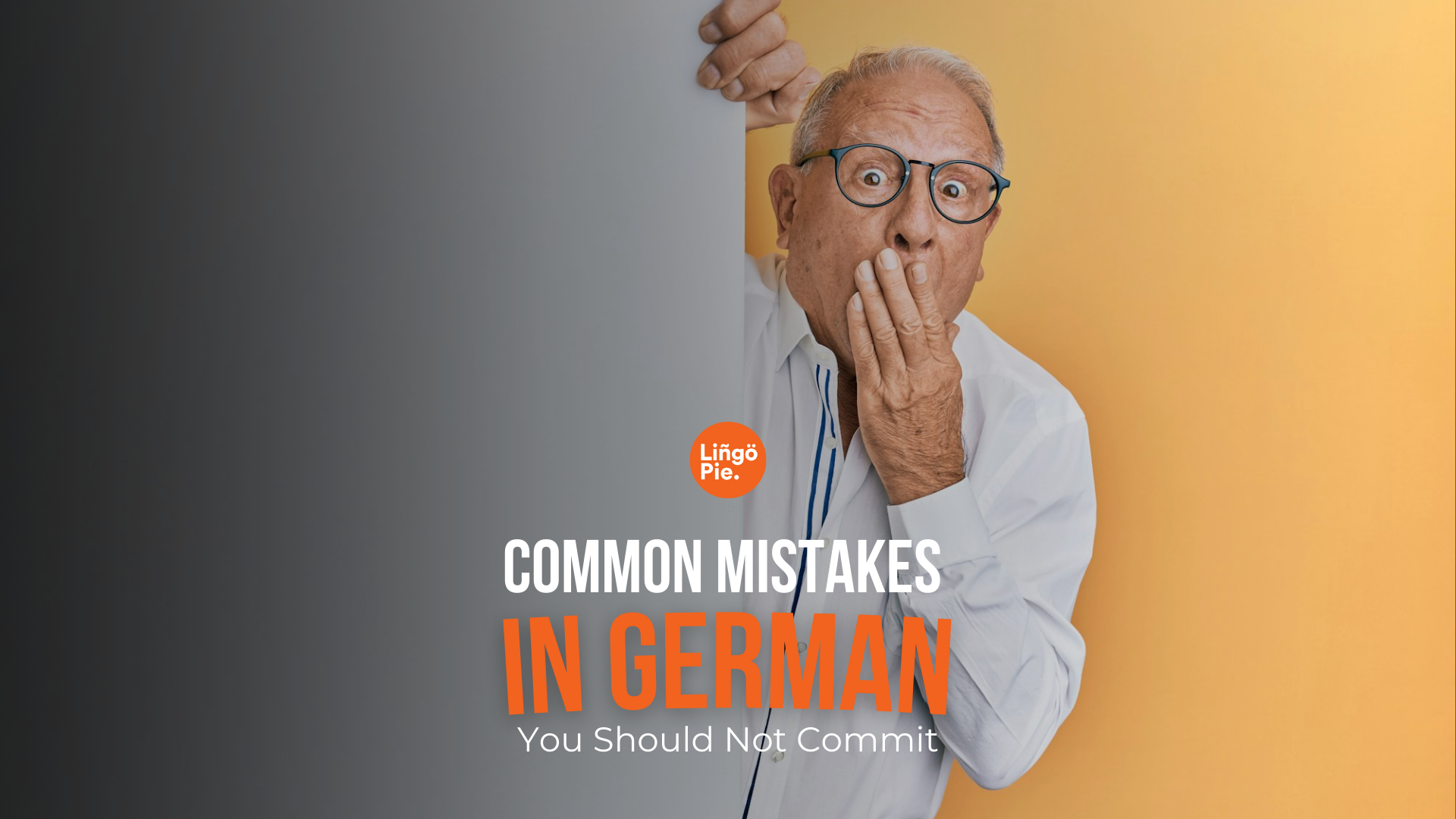
Vergelt’s Gott! — God will reward you!
"Vergelt's Gott!" is a unique German phrase with a rich history. Popular in southern Germany and Austria, it literally means "God reward you!" Don't be surprised if you hear older folks in German TV shows using this one.
- "Sie haben mir sehr geholfen. Vergelt's Gott!" (You've helped me a lot. God reward you!)
- "Vergelt's Gott für Ihre Gastfreundschaft!" (God reward you for your hospitality!)
Ich möchte mich recht herzlich bedanken — I sincerely thank you
This phrase is for when you want to express deep gratitude. It's more formal and heartfelt than a simple "danke." Use it when someone has done something significant for you, like helping with a big project or offering support during a difficult time.
- "Ich möchte mich recht herzlich für Ihre Hilfe bedanken." (I sincerely thank you for your help.)
Ich bin Ihnen sehr dankbar — I am very grateful for you
This expression shows how much someone's actions have impacted you. It's more personal than a basic thank you and conveys a deeper level of appreciation. It's great for situations where someone has gone above and beyond to assist you.
- "Ich bin Ihnen sehr dankbar für Ihre Unterstützung in den letzten Wochen." (I am very grateful to you for your support over the past few weeks.)
Ich kann dir gar nicht genug danken — I cannot thank you enough
Use this phrase when you feel that a simple thank you isn't sufficient. It's perfect for situations where someone has done something extraordinarily helpful or kind. This expression communicates that their actions were so meaningful that you're struggling to fully express your gratitude.
- "Du hast mir bei meinem Umzug so viel geholfen. Ich kann dir gar nicht genug danken." (You helped me so much with my move. I cannot thank you enough.)

How do Germans respond to thank you?
When someone thanks you in German, it's polite to acknowledge their gratitude. Just like in English, there are several ways to respond to "thank you" in German. These responses can range from casual to formal, depending on the situation and your relationship with the person.
| German Response | English Equivalent | Usage |
|---|---|---|
| Bitte | You're welcome | Very common, versatile response |
| Bitte schön | You're very welcome | Slightly more formal |
| Bitte sehr | You're very welcome | Formal, often used in customer service |
| Gern geschehen | My pleasure | Friendly, slightly formal |
| Keine Ursache | No problem | Casual, similar to "don't mention it" |
| Kein Problem | No problem | Very casual, common among younger people |
| Nichts zu danken | Nothing to thank for | Modest response, downplaying the favor |
| Gerne | Gladly | Short and friendly |
| Ich bitte Sie | Don't mention it | Very formal, literally "I ask you (not to)" |
| Schon gut | It's alright | Casual, used when someone is overly thankful |
| Kein Ding | No thing | Very casual, similar to "no biggie" |
| Kein Thema | No issue | Casual, similar to "no worries" |
| Da nicht für | Not for that | Regional, common in northern Germany |
| Passt schon | It's fine | Casual, common in southern Germany and Austria |
Remember, the choice of response often depends on the level of formality and the specific thank-you phrase used. Practice these responses to sound more natural in your German conversations!
Regional Variations of Thank You in German-Speaking Countries
While "Danke" is universally understood in all German-speaking regions, there are notable regional variations.
- Austria: A common phrase here is "Danke vielmals", which means "thank you very much." Austrians also use "Vergelt’s Gott", which has religious connotations and is often heard in rural or traditional settings.
- Switzerland: The Swiss German dialect varies significantly, and you may hear "Merci vilmal", a blend of German and French.
Understanding these regional differences ensures more natural and respectful communication when traveling.4o
How often do Germans typically say "thank you"?
Germans are generally known for their politeness, and saying "thank you" is an important part of their social etiquette. You'll hear "Danke" frequently in everyday situations, from shops and restaurants to public transport. Germans often express gratitude for small gestures, like holding a door open or passing the salt at dinner.
However, there are some nuances to keep in mind:
- In professional settings, more formal phrases like "Vielen Dank" are common
- While politeness is appreciated, excessive thanking might be seen as unusual
- Sometimes, a nod or smile can replace a verbal "thank you" in casual situations
- Regional differences exist, with Northern Germans sometimes saying "thank you" slightly less often
- The formality and frequency of "thank you" can vary depending on the relationship between people
Remember, observing local behavior is the best way to gauge appropriate "thank you" usage. When in doubt, it's generally better to say "Danke" than to skip it entirely.
What are common mistakes to avoid when saying thank you in German?
When learning German, it's easy to make mistakes with "thank you." Here are some common ones to avoid:
- Using "Danke schön" too much - It's correct, but mix it up with "Vielen Dank" or just "Danke"
- Wrong pronunciation of "Danke" - Say it like "DAHN-kuh," not "DAN-kee"
- Mixing up formal and informal - Use "Sie" for formal situations, "du" for informal
- Translating directly from English - "Thank you" isn't "Danke Sie" in German
- Overusing "Bitte" as a response - Try "Gern geschehen" or "Keine Ursache" sometimes
- Forgetting regional differences - Some phrases are more common in certain areas
- Using "Bitte" to say thank you - "Bitte" usually means "please," not "thank you"
Remember, it's okay to make mistakes. The best way to improve is by practicing with native German speakers. Don't be afraid to try out different phrases!
Learn German With Lingopie
If you're looking to enhance your German skills beyond just saying thanks, consider trying Lingopie. This innovative language-learning platform offers a fun and effective way to immerse yourself in the German language through authentic TV shows and movies.
With Lingopie's features, you'll not only improve your vocabulary and grammar but also pick up on cultural nuances and colloquial expressions that will make your German sound more natural. Start your journey to fluency today and soon you'll be expressing gratitude like a native speaker!
FAQs
What are the different ways to say "thank you" in German?
There are several ways to express gratitude in German. The most common is "Danke", which means "thank you." For more formal or emphatic expressions, you can use "Vielen Dank" (many thanks) or "Herzlichen Dank" (heartfelt thanks). In casual settings, "Danke schön" or "Danke sehr" can also be used to mean "thank you very much."
Is "Vielen Dank" formal or informal?
"Vielen Dank" is typically considered formal, but it can also be used in informal settings to express deeper gratitude. It is more polite and appropriate for professional environments or when addressing strangers.
How do you say "thank you very much" in German?
To say "thank you very much" in German, you can use either "Danke schön" or "Danke sehr". Both expressions are polite and can be used interchangeably in formal or informal contexts.
What’s the difference between "Danke" and "Vielen Dank"?
"Danke" is the simplest and most commonly used form of "thank you," suitable for any occasion. "Vielen Dank", however, is used to express a stronger sense of gratitude, often used in more formal settings or when thanking someone for a significant favor.
How do you say "thank you in advance" in German?
To thank someone in advance, you can use "Danke im Voraus". This is commonly used when requesting a favor or expecting assistance in the future.


